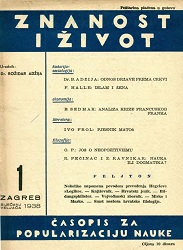
We kindly inform you that, as long as the subject affiliation of our 300.000+ articles is in progress, you might get unsufficient or no results on your third level or second level search. In this case, please broaden your search criteria.

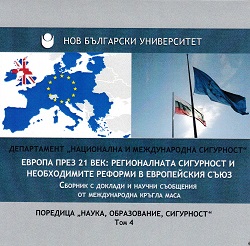
The annual academic forum of National and International Security Department this year is devoted to regional security and reforms in the European Union. Foreign academics and researchers from Poland, Macedonia, Serbia, Russia and other countries are taking part in this broad forum.Why have we chosen this topic?Today, in the first quarter of the 21st century, it appears that the world is on the verge of tolerance of risks and threats. The range of these threats is enormously broad - from the danger of wars between countries and coalitions, to violence among people within states. The world is in a period of devastated global equilibrium and a slowly developing new equilibrium. The temporal distance between these two states opened a place for the manifestation of chaos.In this increasingly difficult to predict world, the European Union has not been so far under such a criticism as the present since its creation. It comes from the ultimate right and the ultimate left, pass through the center and involve more and more ideologists and representatives, even the classical left and center-right political parties. But even a glimpse of their criticism does not show a way out of the crisis. It does not show how to preserve what is valuable in politics, economics and democracy that Europeans have undoubtedly enjoyed and continue to enjoy and how to transfer it into a future European Project.
More...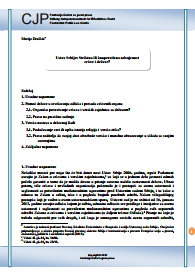
This article is prepared to review some dilemmas concerning the decision on the constitutionality of the Act on Churches and Religious Communities given by the Constitutional Court of the Republic of Serbia in January 2013. The principal of secular state as guaranteed by the Serbian Constitution of 2006 has been tested within the norms on the assistance of the state in enforcement of the decisions and judgments delivered by the churches and other religious organizations, on one hand, and on the rules on the religious instruction in public schools, on the other hand. Taking into account comparative, theoretical and normative method of interpretation, the author concludes that certain provisions of the Serbian Act on Churches and Religious Communities is not in accordance with The Serbian Constitution and the European Convention on Human Rights.
More...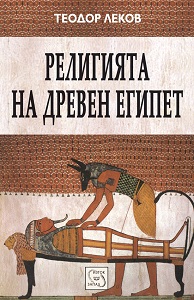
The book studies the Ancient Egyptian religion. The author describes the creation and its driving forces through the view of Egyptian concepts. The idea of God and the divine manifestations, the place of man in the world and the ways to achieve immortality are explored. The exposition is based on the study of ancient hieroglyphic texts and is illustrated with numerous examples. The book is intended for a wide range of readers who are interested in the religion and culture of Ancient Egypt. It contains three chapters: the world of gods, the creation of the world and the world of men. Special attention is paid on the concept of the kingship in Ancient Egypt. The Egyptian terminology and the names of gods and goddesses are formed as a dictionary at the еnd of the book.
More...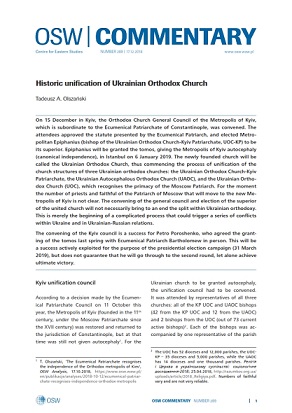
On 15 December in Kyiv, the Orthodox Church General Council of the Metropolis of Kyiv, which is subordinate to the Ecumenical Patriarchate of Constantinople, was convened. The attendees approved the statute presented by the Ecumenical Patriarch, and elected Metropolitan Epiphanius (bishop of the Ukrainian Orthodox Church-Kyiv Patriarchate, UOC-KP) to be its superior. Epiphanius will be granted the tomos, giving the Metropolis of Kyiv autocephaly (canonical independence), in Istanbul on 6 January 2019. The newly founded church will be called the Ukrainian Orthodox Church, thus commencing the process of unification of the church structures of three Ukrainian orthodox churches: the Ukrainian Orthodox Church-Kyiv Patriarchate, the Ukrainian Autocephalous Orthodox Church (UAOC), and the Ukrainian Orthodox Church (UOC), which recognises the primacy of the Moscow Patriarch. For the moment the number of priests and faithful of the Patriarch of Moscow that will move to the new Metropolis of Kyiv is not clear. The convening of the general council and election of the superior of the united church will not necessarily bring to an end the split within Ukrainian orthodoxy. This is merely the beginning of a complicated process that could trigger a series of conflicts within Ukraine and in Ukrainian-Russian relations. The convening of the Kyiv council is a success for Petro Poroshenko, who agreed the granting of the tomos last spring with Ecumenical Patriarch Bartholomew in person. This will be a success actively exploited for the purpose of the presidential election campaign (31 March 2019), but does not guarantee that he will go through to the second round, let alone achieve ultimate victory.
More...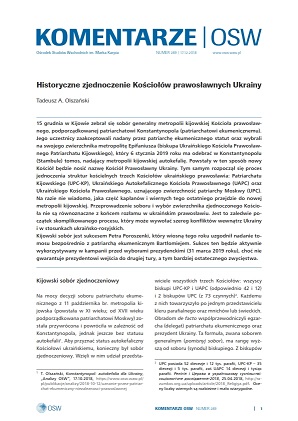
15 grudnia w Kijowie zebrał się sobór generalny metropolii kijowskiej Kościoła prawosławnego, podporządkowanej patriarchatowi Konstantynopola (patriarchatowi ekumenicznemu). Jego uczestnicy zaakceptowali nadany przez patriarchę ekumenicznego statut oraz wybrali na swojego zwierzchnika metropolitę Epifaniusza (biskupa Ukraińskiego Kościoła Prawosławnego Patriarchatu Kijowskiego), który 6 stycznia 2019 roku ma odebrać w Konstantynopolu (Stambule) tomos, nadający metropolii kijowskiej autokefalię. Powstały w ten sposób nowy Kościół będzie nosić nazwę Kościół Prawosławny Ukrainy. Tym samym rozpoczął się proces jednoczenia struktur kościelnych trzech Kościołów ukraińskiego prawosławia: Patriarchatu Kijowskiego (UPC-KP), Ukraińskiego Autokefalicznego Kościoła Prawosławnego (UAPC) oraz Ukraińskiego Kościoła Prawosławnego, uznającego zwierzchność patriarchy Moskwy (UPC). Na razie nie wiadomo, jaka część kapłanów i wiernych tego ostatniego przejdzie do nowej metropolii kijowskiej. Przeprowadzenie soboru i wybór zwierzchnika zjednoczonego Kościoła nie są równoznaczne z końcem rozłamu w ukraińskim prawosławiu. Jest to zaledwie początek skomplikowanego procesu, który może wywołać szereg konfliktów wewnątrz Ukrainy i w stosunkach ukraińsko-rosyjskich. Kijowski sobór jest sukcesem Petra Poroszenki, który wiosną tego roku uzgodnił nadanie tomosu bezpośrednio z patriarchą ekumenicznym Bartłomiejem. Sukces ten będzie aktywnie wykorzystywany w kampanii przed wyborami prezydenckimi (31 marca 2019 roku), choć nie gwarantuje prezydentowi wejścia do drugiej tury, a tym bardziej ostatecznego zwycięstwa.
More...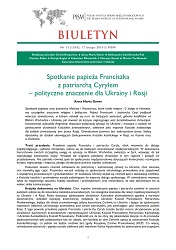
Spotkanie papieża oraz patriarchy Moskwy i Wszechrusi, które miało miejsce 12 lutego w Hawanie, ma szczególne znaczenie religijne i polityczne. Papież Franciszek i patriarcha Cyryl podpisali wówczas oświadczenie, w którym odnieśli się m.in. do bieżących wydarzeń, głównie konfliktów na Bliskim Wschodzie i Ukrainie, jak również do kryzysu migracyjnego oraz prześladowania chrześcijan. Kontrowersje wzbudziły fragmenty dotyczące politycznej sytuacji na Ukrainie i mówiące o nadziei na zjednoczenie ukraińskich Kościołów prawosławnych, odebrane jako wsparcie Kościoła katolickiego dla polityki prowadzonej tam przez Rosję. Oświadczenie powinno być wykorzystane przez Stolicę Apostolską do działań ułatwiających funkcjonowanie Kościoła katolickiego w Rosji, na Krymie oraz w Donbasie.
More...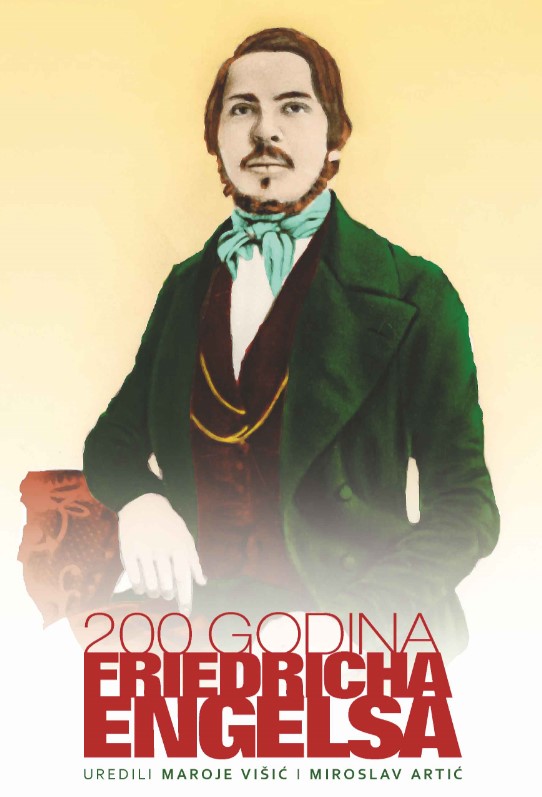
This anthology book is published on the occasion of the bicentennial of the birth of Friedrich Engels, an exceptional thinker and theorist of the revolution. Editors Maroje Višić and Miroslav Artić gathered renowned domestic and international scientists who tried to reevaluate Engels' works and his scientific contribution. The idea behind the book is to point out the everlasting value and significance of Engels’ revolutionary philosophy. Contributing authors offered analytical reading of Engels' ideas, addressing pressing issues in economics, politics, religion, feminism, ideology and in other segments of contemporary society. The papers in an anthology are organized under the chapters: The Reception of Engel’s Philosophy, Actuality of Engels Today with subchapters on working-class and precariat, peasantry as the subject of change, early Christianity as an inspiration; and the last chapter is Revalorization of Family and State. The first chapter tackles the questions if Engels was more than an interpreter of Marx or simply the first Marxist who contributed to the banalization of Marx. It then investigates reception of Engels’ philosophy in ex-Yugoslavia specifically and in philosophical theory in general. The second chapter demonstrates actuality and relevance of Engels today by discussing the topics of working-class and precariat, by making comparison between early industrial society and contemporary society and by tracking development of socialism from utopia to a science. Chapter also deals on the peasantry whose role as a subject of change is thoroughly problematized. Special part of the chapter is dedicated to the influence of the practice of early Christianity on the formation of Engels’ revolutionary idea and to what extent original Christian community served affected the development of Engels’ thought. Final chapter brings papers that, under new circumstances, re-examine the understanding of the state-family relation and their dynamic. This comprehensive anthology attempted to revalorize and appraise Engels’ own contribution to science and philosophy 200 years after his birth. For this it was necessary to “divorce” Engels from Marx so that the fallacy of statement that Engels was second violin to Marx becomes striking.Chapter one tackle the question of whetherEngels was more than an interpreter of Marx or simply the first Marxist to contribute to the banalization of Marx.= Engels' reception is then examined both in the former Yugoslavia and in philosophical theory in general.Special part of the chapter is dedicated to influence of the practice of early Christianity on the formation of Engels’ revolutionary idea. That is, to what extent the examples of the original Christian communities influenced the development of Engels' thought
More...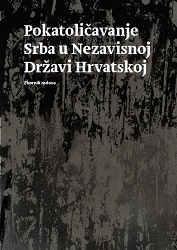
Jedna od najznačajnijih karakteristika Nezavisne Države Hrvatske (NDH) jeste neprijateljstvo njenog režima prema srpskom narodu i Srpskoj pravoslavnoj crkvi (SPC). Nijedna fašistička država koja je egzistirala tokom Drugog svjetskog rata nije sprovela tako široko zamišljeno i organizovano čišćenje državne teritorije od pripadnika neke tradicionalne hrišćanske zajednice kako je to učinila ustaška država kada je riječ o ekspulziji srpske pravoslavne zajednice. Riješenje srpskog pitanja u NDH pored direktne fizičke eliminacije podrazumijevalo je organizovano protjerivanje te ubrzanu i nasilnu nacionalnu asimilaciju. [...]
More...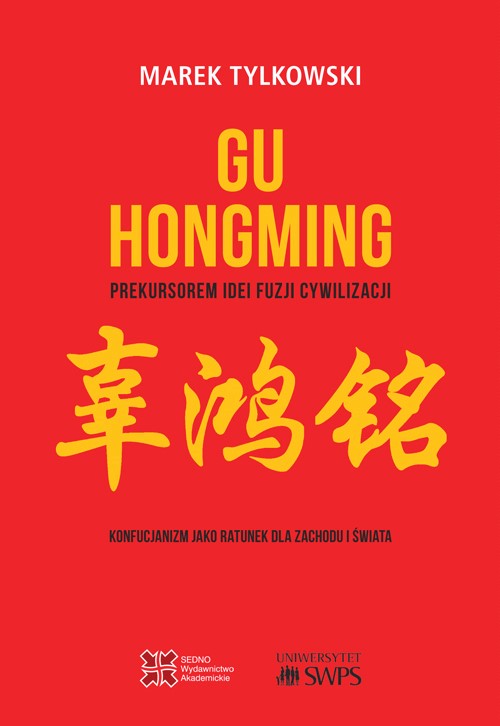
An intellectual biography of one of the most influential Chinese political and social thinkers at the turn of XIXth/XXth centuries.
More...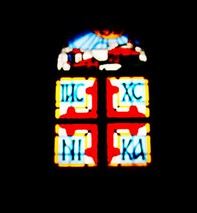
Nije nas iznenadilo to što je protekle nedelje Srpska pravoslavna crkva od državnog vrha tražila prekid zabrane kretanja radi održavanja uskršnje liturgije. Ovim zahtevom crkva je zatražila poseban status koji uživa i van vanrednog stanja – poput poreskih povlastica i neiscrpnog i višegodišnjeg finansiranja crkvenih aktivnosti i potreba iz državnog budžeta. Nakon što je epidemiologdr Predrag Kon zapretio ostavkom, a stvarni gospodar epidemiološke zaštite razgovarao sa patrijarhom, crkva je saopštila da će „poštovati državne mere“ u suzbijanju epidemije.prekid zabrane kretanjaprekid zabrane kretanja
More...
Ne zna se gde sede neodgovornije osobe – u vrhu SPC-a ili u vrhu države. Mrtva trka u brutalnoj nesposobnosti da se razume i prihvati realnost. Ali, niti je to crkva, niti je ovo država. Kamen na kamenu tu nije ostao ni od vere ni od poretka. S jedne strane zatucani i za stvarnost i ljudske živote slepi popovi, s druge – zadrto nesposobni iza stvarnost i ljudske živote slepi politički čelnici. Na apsolutno idiotski zahtev SPC-a da se za vikend dozvoli liturgijsko okupljanje vernika, država odgovara apsolutno idiotskim produženjem zabrane kretanja za još jedan dan – sa 60 sati na 84 sata.
More...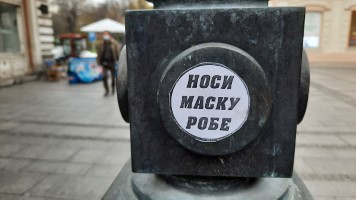
Republika Srbija je svetovna država. Crkve i verske zajednice su odvojene od države. Nijedna religija ne može se uspostaviti kao državna ili obavezna. (Član 11. Ustava Republike Srbije) Premijerka nas je nedavno obavestila da je jedan od prioriteta Vlade – vladavina prava.
More...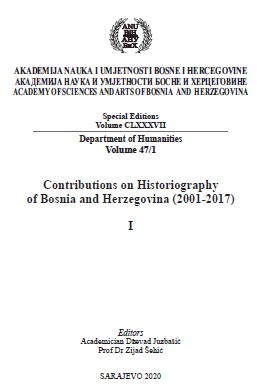
In the period of 2001–2017 Croatian Ottomanists (nine, but really seven more productive authors) had produced a fairly large number of innovative works dealing with Bosnia-Herzegovina, or, more precisely, the eyalet of Bosnia in the early modern period (roughly 1500–1800) which for a certain time was including about half of present-day Croatia. The parts of Croatia in the Adriatic hinterland were belonging to the Bosnian eyalet until the end of the 17th century, as well as western most part of the land between the Sava and Drava rivers, while the rest of that territory, that is, central and eastern Slavonia was attached to the new eyalet of Kanizsa in 1600, yet it had mostly remained under Bosnian control in financial matters. This was the reason why the history of the whole space was outlined as one and the same larger unit. A wide range of subjects featuring new methods, advanced and original was discussed, from social and economic issues, to religion and culture. The most interesting findings and achievements had been made in the matters of analyzing the intricacies of Ottoman taxation. It turned out that the tax assessment must not be apprehended at the first glance, but that the historian has to include the rather hardly visible practices on the ground, influenced by local realities, with a huge impact on the land regime, and even more so, on demographic estimations. Concerning the high rates of conversion to Islam, special attention was made to the hitherto neglected factor, that is, to the financial stimuli. It was found that, due to the specific situation of the economic position of the peasantry, in Bosnia, or its central parts together with northern Herzegovina, embracing Islam brought more substantial easements than in much of the rest in the Balkans. As for the military issues, ocaklık timars and autonomy fresh interpretations were also offered. To the history of towns, culture, relations between the eyalet and Dubrovnik and particularly ecohistorical subjects due respect was paid with remarkable success. Last but not least, the new reading of Evliya Çelebi’s travelogue had resulted in many new insights. Much of this work was performed in a manner like looking for a needle in a haystack, but in my opinion it was quite rewarding.
More...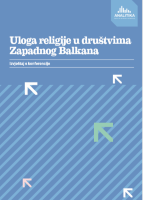
Konferencija “Uloga religije u društvima Zapadnog Balkana” je regionalna konferencija koju su organizovali Institut za demokratiju i medijaciju (IDM) iz Albanije, Centar za društvena istraživanja “Analitika” iz Bosne i Hercegovine, Beogradska otvorena škola iz Srbije i Institut za društvene i humanističke nauke Skoplje (ISSHS) iz Republike Sjeverne Makedonije. Cilj konferencije je istražiti izazove i mogućnosti kada je u pitanju uloga religije u društvima Zapadnog Balkana, te doprinijeti jačanju društvenih mehanizama i politika kako bi se na što bolji način odgovorilo budućim izazovima u ovom domenu. Pored toga, konferencija je pružila priliku da se prezentiraju rezultati istraživanja koje je provedeno u zemljama Zapadnog Balkana, a koje se bavilo ulogom religije u društvu. Konferencija je okupila lidere vjerskih zajednica, predstavnike akademske zajednice i medija, vladine zvaničnike i predstavnike civilnog društva sa Zapadnog Balkana, ali i otvorila i širu raspravu među njima o potencijalu za jačanje uloge religije u ovim društvima. U svjetlu općih izazova s kojima se suočavaju zemlje Zapadnog Balkana, kao što su nizak ekonomski razvoj, spora tranzicija i problemi sa vladavinom prava, učesnici su poseban naglasak stavili na implikacije i doprinos religije ovim pitanjima. Konferencija je organizovana uz velikodušnu podršku Ministarstva vanjskih poslova Holandije i uz učešće predsjednika Republike Albanije, Njegove ekselencije gospodina Ilira Mete.
More...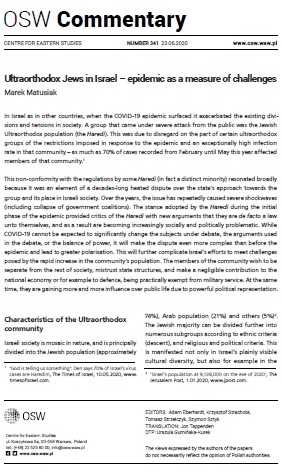
In Israel as in other countries, when the COVID-19 epidemic surfaced it exacerbated the existing divisions and tensions in society. A group that came under severe attack from the public was the Jewish Ultraorthodox population (the Haredi). This was due to disregard on the part of certain ultra orthodoxgroups of the restrictions imposed in response to the epidemic and an exceptionally high infection rate in that community – as much as 70% of cases recorded from February until May this year affected members of that community.
More...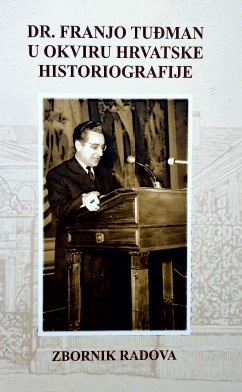
On the occasion of the tenth anniversary of the death of Dr. Franjo Tuđman, the first director of the Institute for the History of the Workers' Movement of Croatia and the first president of the independent, contemporary and democratic Republic of Croatia, the Croatian Institute of History organized a scientific conference on December 10 and 11, 2009. Dr. Franjo Tuđman in Croatian Historiography. Although Dr. F. Tuđman is better known and more interesting to the general public as a politician and statesman, and although his work as a historian and politician is difficult to separate, the organizers of the scientific conference focused on the work of Dr. F. Tuđman as a historian, wanting scientists, primarily historians and political scientists, from scientific novices to academics, sine ira et studio, through selected topics to approach a comprehensive questioning of the significance and influence of Dr. F. Tuđman on the historiography of modern Croatian history.
More...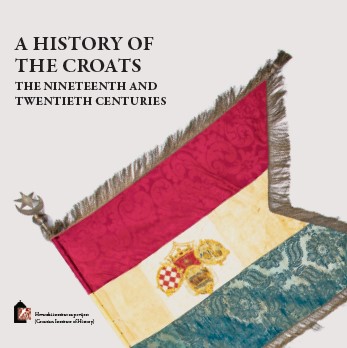
Between the two world wars, the Croatian society developed in a multinational state under the rule of the Serbian royal dynasty of Karađorđević. The newly created Yugoslavia was, as Robert Gerwarth has observed in his book The Vanquished: Why the First World War Failed to End, 1917-1923 (p. 14) a “‘multi-national empire in miniature’, but ‘with reversed ethnic hierarchies’ than the failed Austro-Hungary Monarchy.” There are several reasons why the State of SCS united with the Kingdom of Serbia, the key ones being the military-political goals of Serbia and Italy. The Kingdom of Serbia announced at the very beginning of the war that it would fight to achieve this goal and the Serbian Prime Minister Nikola Pašić understood unification as expanding the territory and creating a Greater Serbia. Furthermore, a group of Croatian, Slovenian, and Serbian politicians who had been working abroad as the Yugoslav Committee since 1915 advocated South Slavic unification. This group vehemently opposed the provisions of the secret Treaty of London of 1915, which promised Italy the Eastern Adriatic with a majority Croat population in exchange for entering the war on the side of the Entente. Finally, in the weakened Austro-Hungarian monarchy, a Yugoslav club of Croatian and Slovenian politicians who advocated a trialistic arrangement of the Monarchy was active from 1917. The Kingdom of Serbia had an international reputation and position that exceeded the influence of the Yugoslav Committee with which it negotiated the draft of the future state. The most specific result of their cooperation was the Corfu Declaration of July 1917, by which Nikola Pašić on behalf of Serbia and Ante Trumbić on behalf of the Yugoslav Committee confirmed that the new state would be based on the principles of equality and freedom of choice – only the instruments ensuring the protection of the citizens of the State of SCS were not envisaged. The state of SCS was basically an unacknowledged state formed on the ruins of the Habsburg Monarchy, as it was only recognized by the Kingdom of Serbia. It was clear that it was only a transitional solution towards unification with Serbia.
More...
When Hitler decided to invade Yugoslavia and destroy it as a state, his representatives contacted the largest Croatian political party – the Croatian Peasant Party (HSS). The Germans wanted the party’s leader, Vladko Maček, to head the new, independent Croatia after the break-up of Yugoslavia. But Maček rejected the proposal. Then the Ger-mans turned to the Ustasha organization in Croatia and its leader Slavko Kvaternik declared the independent Croatia on April 10, 1941, the same day when the German army entered Zagreb. The Kingdom of Italy had previously supported the Ustasha organization, but after the assassination of the Yugoslav King Alexander Karađorđević in Marseille in 1934, organized by the Ustashas, the Italians restricted the activities of the Ustasha organization in their territory. In the circumstances of preparations for the attack on Yugoslavia, the Italians organized the passage of several hundred Ustashas led by Ante Pavelić to Croatia.
More...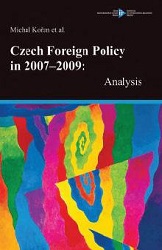
The Mediterranean and the Middle East, although they did not fall under the priorities of Czech foreign policy after 1989, had to be taken into account by the Czech Republic after it joined NATO and the EU due to the wider interest of the trans-Atlantic allies in regional stability and security. For this reason, issues like terrorism, immigration, the Middle East peace process, proliferation of weapons of mass destruction, peacekeeping missions, and the Euro-Mediterranean cooperation were among the most frequently discussed topics in the Czech political scene during the 2000s. The Middle East agenda have affected our relations with allies and they have been the subject of home competition on left-right axis. The only long-term Czech interest relating to the region was the mainly rightist government’s attempt to reduce the Czech Republic’s one-sided dependence on imports of Russian oil and gas, which was demonstrated by the support for the Nabucco pipeline project during the Czech EU presidency.
More...